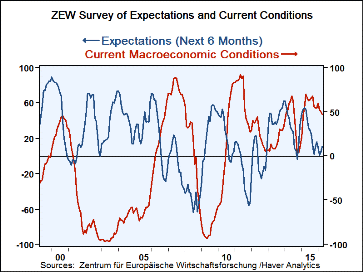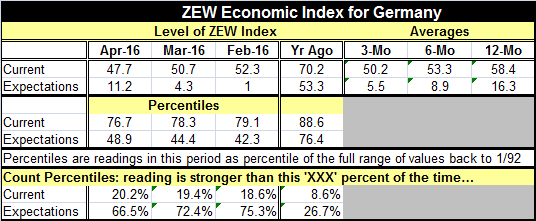 Global| Apr 19 2016
Global| Apr 19 2016ZEW Expectations Make Gain
Summary
The ZEW current index continues its slow erosion, but expectations rose to 11.2 in April from 4.3 in March. At 11.2, expectations are at the border of the bottom one-third of their historic queue of values. The slipping current index, [...]
 The ZEW current index continues its slow erosion, but expectations rose to 11.2 in April from 4.3 in March. At 11.2, expectations are at the border of the bottom one-third of their historic queue of values. The slipping current index, at 47.7, stands at the border of its top 20 percentile. One year ago both were much stronger with the current index in the top 10% of its queue of values and expectations just outside the top 25%. Despite the rebound in expectations, expectations are remaining in a weaker setting that they had for most of 2015.
The ZEW current index continues its slow erosion, but expectations rose to 11.2 in April from 4.3 in March. At 11.2, expectations are at the border of the bottom one-third of their historic queue of values. The slipping current index, at 47.7, stands at the border of its top 20 percentile. One year ago both were much stronger with the current index in the top 10% of its queue of values and expectations just outside the top 25%. Despite the rebound in expectations, expectations are remaining in a weaker setting that they had for most of 2015.
The ZEW financial experts provide profitability estimates for the various German stock sectors. Currently, they elevate consumption/trade and construction stocks to the higher level with each having a higher rating less than 5% of the time. Info-tech is well-regarded with an 85th percentile standing. However, banking insurance and utilities all have lower 20% expectations. Vehicles carry a 69th percentile standing, a reasonably firm assessment.
The consumer has been carrying the German economy and that continues to be the case. The ZEW financial experts remain guarded on the outlook with poor assessments for the financial sector and for insurance. Despite some pick up in expectations in the ZEW survey this month, the Bundesbank just warned of a slowing in its economic assessment yesterday. Germany continues to grow but not to impress.

Robert Brusca
AuthorMore in Author Profile »Robert A. Brusca is Chief Economist of Fact and Opinion Economics, a consulting firm he founded in Manhattan. He has been an economist on Wall Street for over 25 years. He has visited central banking and large institutional clients in over 30 countries in his career as an economist. Mr. Brusca was a Divisional Research Chief at the Federal Reserve Bank of NY (Chief of the International Financial markets Division), a Fed Watcher at Irving Trust and Chief Economist at Nikko Securities International. He is widely quoted and appears in various media. Mr. Brusca holds an MA and Ph.D. in economics from Michigan State University and a BA in Economics from the University of Michigan. His research pursues his strong interests in non aligned policy economics as well as international economics. FAO Economics’ research targets investors to assist them in making better investment decisions in stocks, bonds and in a variety of international assets. The company does not manage money and has no conflicts in giving economic advice.
More Economy in Brief
 Global| Feb 05 2026
Global| Feb 05 2026Charts of the Week: Balanced Policy, Resilient Data and AI Narratives
by:Andrew Cates






